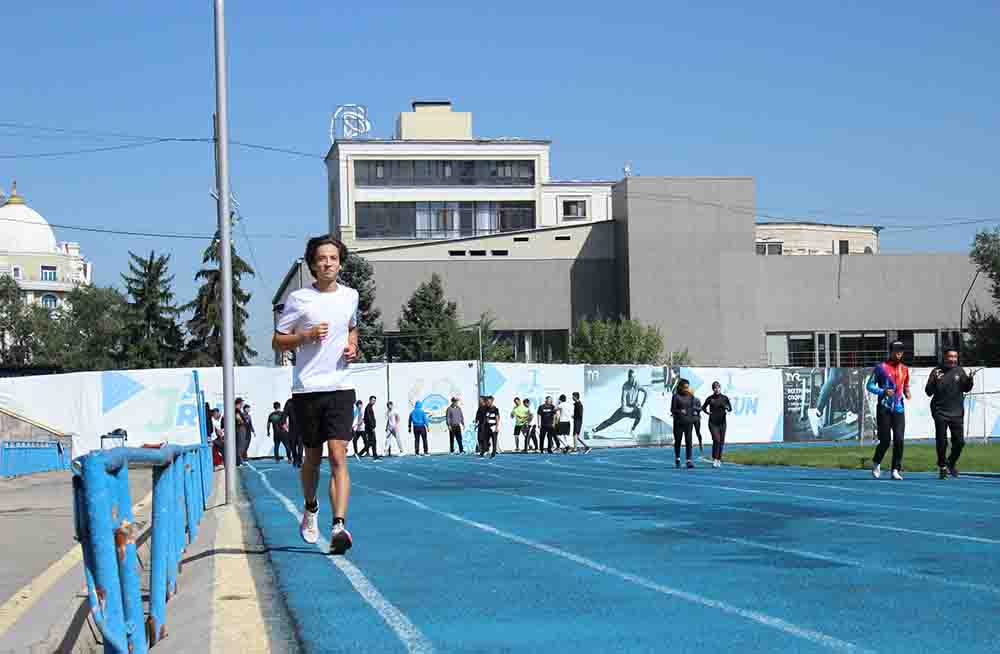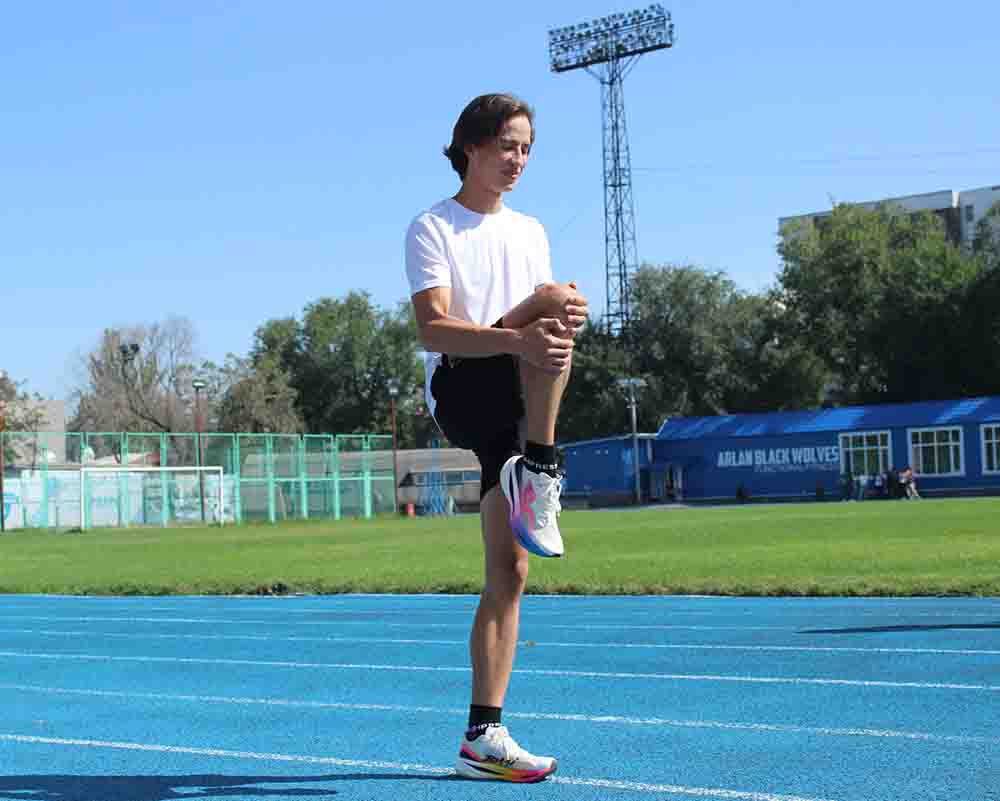On September 29, 2024, more than 15,000 runners from 50 countries will gather on Republic Square for the 2024 Almaty Marathon. Covering 42.195 km, the course loops the city, past many of its historic sites and includes pristine views of Zailiyskiy Alatau Mountains. The marathon uses proceeds from the event to help raise money for children with special needs. This year, it has raised 65.5 million tenge for eight charities.
KIMEP University will sponsor 50 students to participate in the marathon’s 10 km race, including members of the university’s running club. Emil Yesselbayev, Jacob Ewing, and Begench Melayev will join on a journey that goes beyond the race itself.
Emil Yesselbayev, the head of KIMEP University’s running Club, joined six months ago. He’s not new to running, as he has competed in several 10 km races, but on Sept. 29, he faces his biggest, longest running challenge: The 2024 Almaty Marathon.
“I want to experience what it’s like to run a full marathon and finish it strong,” he said. “Marathon preparation often starts more than a year in advance. The training load builds up over time to about 80-100 km per week, but a month before the marathon, the intensity gradually decreases.”

This strategy is essential for preventing fatigue and ensuring the body is well-rested before the big day.
Jacob Ewing, a 26-year-old second-year master’s student in international relations and member of the running club, is no stranger to marathon preparation, though his journey took an unexpected turn this summer. After struggling with small injuries and illness, Ewing managed to recover and recently hit a personal milestone by running 60 miles (100 km) in a week.
“This new high mileage has made my legs feel better and my running smoother. But I don’t suggest others do this, since it can lead to injury if your legs are not prepared,” Ewing said.
His usual running routine includes a light run that helps the body efficiently utilize oxygen and circulate blood.
“Easy pace runs are usually slow enough that they can act as a warmup themselves – lots of stretching isn’t always beneficial,” Ewing said. “I run for about an hour and a half throughout the city – lately my favorite route has been from KIMEP down to Kurmangazy street, then along Kurmangazy to Ghandi Park, and then back to KIMEP. After I finish, then I close out with some static stretching.”
His preparation, while focused on long-distance endurance, has also included speedwork. A recent 5 km tempo run completed in 19:36 was a small personal victory for him.
“To do that in training, alone, on a random Tuesday, is very encouraging and tells me that my training is going in the right direction,” he said.
Like Yesselbayev, Ewing tapers his training in the final weeks to ensure his legs are fresh for race day. His goals for the 10 km race are ambitious—he hopes to beat his previous record of 41:31, ideally running under 40 minutes.
“Because of the huge downhill portion of the 10km race course in Almaty, there’s sort of an asterisk on any result, but it’s still a fun and challenging time,” he said.
For Begench Melayev, a second-year student majoring in international law, the 2024 Almaty Marathon will be his first race of this scale. Unlike Yesselbayev and Ewing, Melayev is focused on completing the 10 km race, without a specific time goal.
“To reach the finish line is probably my main goal,” he said.
Balancing his training with academic responsibilities has been a challenge for Melayev, but he remains dedicated, going for 5 km runs three times a week and stretching to avoid injuries. His preparation also includes a few uphill runs, which he enjoys, especially through the city’s terrenkur paths.
“I plan to run 10 km at least twice before the marathon,” he said, making sure his body is ready for the race.
Diet and hydration also play crucial roles in their preparation. Yesselbayev focuses on carbohydrate loading, eating bread and pasta in the days leading up to the marathon.
Ewing says hydration and balanced meals are important to fuel his runs and rebuild muscles.
“Being dehydrated has been linked with a much higher chance of injury among runners, he said. “Make sure to eat a decent amount. When you run so many kilometers a week, it’s important to give your body plenty of fuel so that you don’t get exhausted and so your muscles and lungs can improve.”
In the two days before the race Ewing says he eats basic foods.
“ I avoid spicy food, especially ramen, and any food that I know my stomach can react to,” he said. “On the morning of a race, you will likely have a turbulent stomach from nerves, so eating basic and normal foods, like rice, bread, bananas, and oatmeal, in advance is important to having a good race. And water, always lots of water.”
Melayev, meanwhile, keeps things simple, avoiding oily foods and sticking to boiled meals to prevent any stomach issues on race day.
As the marathon draws closer, Yesselbayev and Ewing both reduce their training load.
“You want to rest as much as possible in that last week so you’re fresh and fully ready for the marathon,” he said.
Ewing takes a similar approach, planning no intense workouts during the final week.
“I plan to run only 50km to give my legs a chance to rest in advance of the Sunday race,” he said.
Melayev, in contrast, plans to run more, aiming to build confidence in the final days before his first marathon.
Beyond the physical preparation, marathon running is as much a mental challenge as it is a physical one.
“The more I think about the race, the more nervous I get,” Ewing said. “Sometimes nerves can be good though, because you can use those to run faster than you think.”
For Ewing, the race offers a chance to test his limits.
Melayev, participating in his first marathon, is more focused on enjoying the experience. Music plays a big role in his pre-race routine, helping him stay motivated and energized throughout the race.
“I listen to music that makes me feel more energetic and motivated. It helps him push through the final kilometers,” he said.
As race day approaches, each runner reflects on what they’ve learned from their marathon journey. For Yesselbayev, running has become a way of life.
“Running has a positive impact on my life,” he said. “It keeps me involved in university activities and makes life more interesting.”
Ewing, who has faced numerous setbacks during his preparation, sees the marathon as an opportunity to grow.
“Running has taught me patience and perseverance,” he said. “The sport is as much about resilience as it is about speed.”
Melayev, meanwhile, views the marathon as a starting point, both for his running career and personal growth.
“My goal is to make sure this first marathon is not my last,” he said, eager to continue running and take on longer distances in the future.
Their collective advice to aspiring runners is enjoy the process, listen to your body, and take pride in every step. Whether it’s running your first race or chasing a personal best, the journey itself is what makes the marathon experience truly rewarding.

